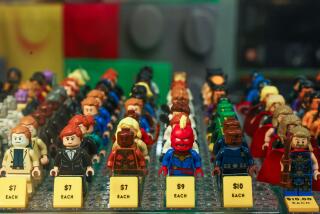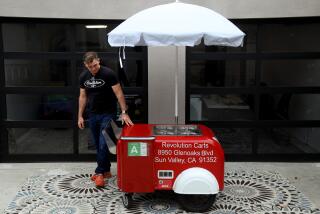Well-Stocked Stores to Keep Scooter Sales Rolling
- Share via
A Los Angeles judge’s ruling halting manufacturers’ sales of certain children’s scooters isn’t likely to put the brakes on this year’s No. 1 holiday gift, toy industry experts said. Retailers already have plenty of the chic gliders in stock.
On Tuesday, U.S. District Court Judge Manuel R. Real granted a temporary restraining order sought by Razor USA, a Cerritos-based company and the leading scooter importer, blocking 12 competitors from making, importing or selling similar products through Dec. 4.
Razor, which was awarded a patent Oct. 31 for its scooters’ brake system, said the defendants infringed that patent and also copied the look of its scooter, including its oval foot-grip pad, its polished aluminum frame and translucent colored wheels.
Razor’s lawsuit follows a long tradition in the copycat toy industry: manufacturers trying to guard their property during an increasingly short “must-have” holiday shopping period, according to Sean McGowan, a longtime toy industry analyst and the director of research for Gerard Klauer Mattison in New York.
And that’s also the exact time the toys are most likely to be knocked off, McGowan said.
“Suing is a way of doing business in the toy industry and patents are a license to sue,” McGowan said. “You may ultimately lose, but you win by keeping your competition out of the market at a critical time of year.”
That’s why most of the suits are filed before Thanksgiving, in hopes that even a temporary order will derail a competitor just before the all-important holiday selling period, McGowan said.
For the time being, consumers probably won’t notice any effect from the lawsuit. Retailers said they have ample stock of the lower-priced scooters, as well as plenty of the $100 Razor brand, the top seller. Retailers said that so far they are only blocked from buying more of the products named in Razor’s suit, not from selling the items they already have.
“We have plenty of stock of all the brands,” said John Reilly, a spokesman for K-B Toys. “As a fellow consumer, my message would always be to err on the side of caution and shop early, but we don’t anticipate a problem at this time.”
Top specialty toy seller Toys R Us Inc. also said it is well-stocked with a variety of scooters.
But even if the order is not made permanent, the defendants could feel the pinch from missed sales and excess inventory when the trend moves on, toy veterans said.
For example, Lewis Galoob Toys Inc. won a yearlong copyright infringement battle brought by Nintendo of America Inc. over the “Game Genie,” which allowed Nintendo games to be customized.
But once Galoob had the right to resume selling its product, the market had moved on and neither Nintendo products nor their enhancements were in demand.
On the other hand, Ty Inc., seeking to halt the copies of its hugely popular Beanie Babies, won nearly $300,000 from Los Angeles-based Imperial Toy Corp. after Ty accused its competitor of copyright infringement on eight of Imperial’s Friendly Pebble Pets.
Just two years later, Ty paid Imperial $1.35 million to settle a claim that Imperial sold a “Roary” lion toy a year before Ty began making a like-named product.
Razor scooters have become the hottest product among older children and teens since J.D. Components of Taiwan first began exporting the brand to the United States in March 1999. With the exception of sales through retailer Sharper Image, Razor USA has the exclusive contract to market and distribute the J.D. Components scooter in the United States. Razor expects to sell about 5 million of the scooters this year.
That popularity has spawned dozens of similar products and knockoffs as other companies moved to get a slice of the scooter frenzy.
“We have done nothing wrong,” said James Slater, chief executive of Toronto-based Gen-X Sports Inc., whose Oxygen brand scooter accounts for about 30% of Gen-X’s sales. “We have plenty of prior art of our product that proves their patent invalid and that we have not infringed.”
Although most retailers believe they are entitled to sell the scooters they already have, toy-seller Children’s Place Retail Stores Inc. is in a unique position, because it is also the manufacturer of its $59.50 Yaak scooter and therefore has halted Yaak sales.
The 400-store, Secaucus, N.J.-based chain will lose about $2 million in sales between now and Dec. 4, said Steven Balasiano, the company’s general counsel. Children’s Place, which has been selling about 8,000 scooters a week--nearly 200,000 altogether--makes about $30 on each scooter.
“We are going to lose that business but the judge asked Razor to post only a $25,000 bond in the case that we will [win],” Balasiano said, promising an appeal. “We don’t think that’s right.”
K2 Inc., the Los Angeles-based sporting goods company, fought the ban in court but said Wednesday that the ruling affects only about 22,000 scooters and would not have much of a financial impact on the company.
“We might retrofit the brake, which wouldn’t be that hard, or else just ship them off to Europe, where there is no ban,” said John Rangel, K2’s chief financial officer. Another strategy, he said, is just to wait until Dec. 4 to see whether the restraining order becomes permanent.
Variflex Inc., a Moorpark maker of scooters and in-line skates, said Wednesday that Razor withdrew its request to block Variflex Stinger scooter sales after deciding that the manufacturer did not infringe Razor’s patent.
Razor also reached settlement agreements with two other manufacturers.
Several other companies that make similar scooters, including bike maker Huffy Corp., were not included in the lawsuit.
More to Read
Inside the business of entertainment
The Wide Shot brings you news, analysis and insights on everything from streaming wars to production — and what it all means for the future.
You may occasionally receive promotional content from the Los Angeles Times.











